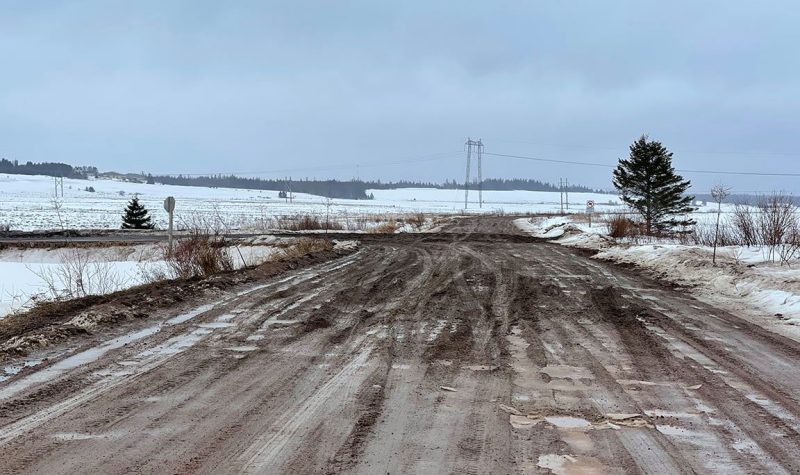Thaddeus Holownia lives and works on the unpaved section of Jolicure Road, running from Parson Road about four kilometres until it turns into High Marsh Road. And like many dirt roads in rural Tantramar this spring, Jolicure Road has been a mess.
So much so that Holownia got a note in his mailbox to let him know he wouldn’t be getting any mail for awhile.
“Canada Post came down the road last week, and the guy was delivering this handwritten note saying, I won’t be coming here if the road is in bad condition. So don’t expect your mail regularly,” says Holownia.
Though one of Holownia’s neighbours had been complaining about the road previously, prompting MLA Megan Mitton to bring the matter up in the New Brunswick legislature this week, Holownia says he thinks the fact that Canada Post stopped delivering finally inspired some action.
“When we started making a lot of noise to as many people as we could about Canada Post not coming down the road,” says Holownia. “I think that hit a bit of a nerve with somebody.“
The next day, Holownia says, a provincial pick up drove by and then a grader came to make a couple of passes on the road.
Now, he says, you might not even notice there was ever a problem, though he doesn’t expect the solution to last long.
“The grading is kind of a band aid solution that happens three or four times a year,” says Holownia. “Right now, if you were to drive on it, you’d think, this is a great road, what are people complaining about?”
“But as soon as it’ll rain, probably this weekend,” says Holownia. “It’ll start loosening up the wet spots again. And so then you end up with these mucky, rutted places where you can barely drive.”
The mud and rutting makes it a nightmare to drive in anything but a four-wheel drive truck, says Holownia. There’s about 40 per cent of the year where Holownia can’t ask clients to come to his studio, because it’s not passable in either direction, he says. And while he doesn’t have far to go for work, he feels for other residents who have to brave the road to get to their jobs.
While rural dirt roads are prone to muddiness and ruts, Holownia says he can’t recall it being quite this bad before. This year, “was the worst that I can remember,” says Holownia. “And it’s been bad. I think it’s accumulation from years of letting it go.”
Holownia says chip sealing the four-kilometre stretch would be the ultimate solution, but he doubts that’s ever going to happen. Instead, he’s hoping the road will get some attention in terms of assessing where the springs or drainage issues are, and doing structural repairs to make sure it doesn’t get as bad as it did this spring.
Transportation department spokesperson Mélanie Sivret told the Telegraph Journal that it’s not uncommon for gravel roads to get “soft and muddy” at this time of year, but also that the stretch might be up for a “surface upgrade” in future capital programs.
Holownia says he feels the maintenance over the years has fallen by the wayside, and that the quality of work being done is just not the same as it used to be.
“It’s interesting, living in a place for a long time and observing how money gets spent by government,” says Holownia. “And how well trained people are in their jobs, in terms of the way they operate machinery and maintain our road. There’s been a big difference over the years that I’ve noticed. And I’m no expert, but I’m not blind to the way things work.”
Holownia says he also noted this year’s snow clearing was lower priority than previous years, and last summer, the province stopped doing treatments to prevent dust on the road.
“It’s just neglect,” says Holownia.
MLA Megan Mitton agrees. In question period at the legislature on Tuesday Mitton said, “Jolicure Road isn’t the only road in my riding, let alone the province, that has been neglected. And it isn’t just dirt roads or less traveled roads.”
Mitton called Route 16 near Jolicure, “an embarrassing patchwork that should have been remedied years ago,” pointing out that it’s part of the Trans-Canada Highway, and a main route connecting to PEI.
“It’s an embarrassment to New Brunswick,” she said.
Mitton said the Department of Transportation and Infrastructure (DTI) was “dropping the ball due to chronic underfunding and inadequate adequate asset management.”
“Does the minister of DTI actually think your department’s budget is adequate to maintain safe, and at the very least passable, roads in our province?” Mitton asked.
With minister for DTI, Jill Green, absent from the legislature, Premier Blaine Higgs took on responding to Mitton.
Higgs seemed to agree with Mitton that asset management was an issue, but dodged on the question of whether budgets were actually adequate, instead pointing out that they hadn’t changed during the pandemic.
Higgs did take the opportunity to comment on the demand for new construction and twinning in the province.
“I think the point here that needs to ring home is we have a lot of roads in this province,” said Higgs. “I think more per capita than anywhere else. And how often do we hear, ‘build another new road, twin another highway, don’t make it safe and passable, but just build more’?”
Higgs then echoed Mitton, telling the legislature, “we need to fix what we have… We have to focus on roads we have and make them passable and sufficient in all areas of our province.”
Hear this story as reported on Tantramar Report:



